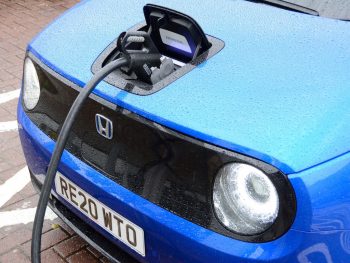Research reveals the reforms needed to drive confidence in charging
Key changes are needed in the areas of EV charging payments, roaming, making data available, pricing transparency and reliability to improve driver confidence in the public network.

The survey revealed widespread support for the rollout of contactless credit and debit card payments
That’s according to research by the recently founded Electric Vehicle Association (EVA) England, which asked drivers for their views to help respond to the consultation on the ‘Consumer Experience at Public Electric Vehicle Chargepoints’.
Over 1,000 drivers participated in the survey in England, who highlighted widespread support for the rollout of contactless credit and debit card payments, being able to use one charge card (also known as an RFID card) or app across multiple charging network operators, and higher levels of reliability. The survey also highlighted the importance of the public charging network even to those with off-street parking, with 92% of electric vehicle drivers relying on the public charging network at least once a month.
Based on the results of the survey, EVA England has made the following recommendations to Government:
- Charge points should offer a choice between three standardised payment methods: 1) A contactless credit or debit card 2) A ‘universal’ charge (RFID) card 3) A smartphone app
- The Government should mandate that Charge Point Operators enable roaming and allow for drivers to use one app or RFID card on all networks.
- Government should mandate a minimum amount of data that must be made open in a standardised format to EV drivers to better equip drivers to plan their charges along the public charging network.
- All prices for electricity sold at EV charging sites should be stated in pence/kWh.
- Government should work with the EV charge point industry to establish a roadmap to mandate 99% reliability and 24/7 helpline availability within agreed timescales.
- Standardised signage should be increased in terms of both number and visibility both at the site of the charge point as well as on a range of approach roads.
Gill Nowell, a director at EVA England, said: “We recognise that the pace of charge point deployment is increasing and that the infrastructure going in the ground today is greatly improved from that which was being installed even five years ago. However, we encourage Government to intervene now in order to ensure that all charging infrastructure is reliable, safe and user-friendly, across all driver groups.”
For a copy of the full report, please contact EVA England.


















Glenn Ewen15. Apr, 2021
Interesting how things need to be “mandated” by Government. EVs and their infrastructure have to stand/or fall on their own. Assistance from
Government is good, but mandating will not provide what is needed, only what someone (usually not the right person) tells the Government
they want. If it fails, it will be because it wasn’t what was really wanted.